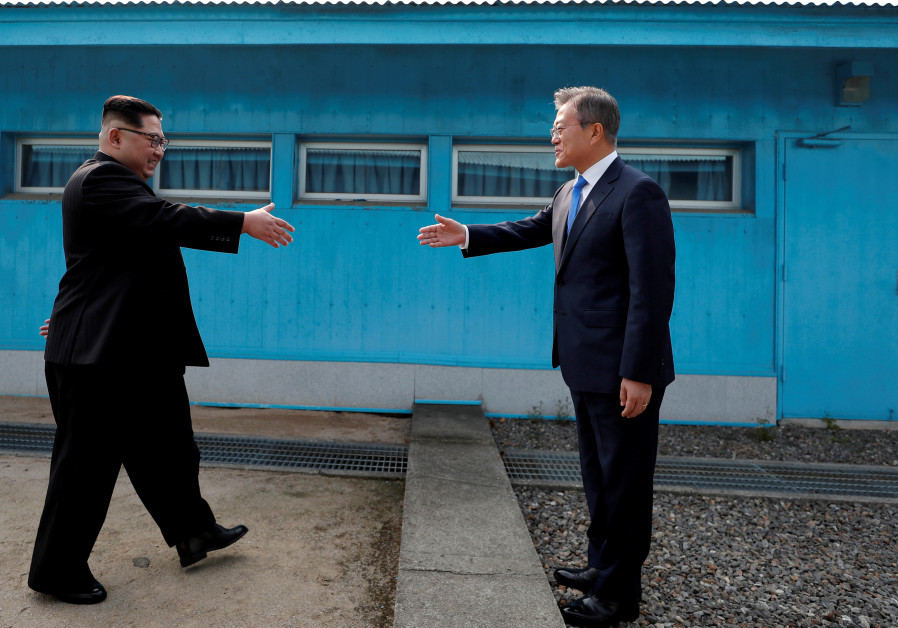The two Koreas reaffirmed the goal of complete denuclearization during their summit.

SEOUL – US President Donald Trump was pleased that the leaders of the two Koreas reaffirmed the goal of complete denuclearization during their summit, Seoul officials said on Sunday, as the allies gear up for Trump’s own unprecedented meeting with North Korean leader Kim Jong Un.
Trump had a phone call with his South Korean counterpart Moon Jae-in late Saturday, one day after Kim and Moon vowed “complete denuclearization” of the Korean peninsula at the first inter-Korean summit in more than a decade.
Moon and Trump agreed on the need for an early summit between Trump and Kim, and explored two to three potential locations, the Blue House said.
A senior US official has said Singapore is being considered as a possible venue for the Trump-Kim summit.
“Trump said it was good news for not only the two Koreas but the whole world that they affirmed the goal of realizing a nuclear-free Korean peninsula through a complete denuclearization,” South Korea’s presidential Blue House said. “Trump was looking forward to talks with Kim and there would be a very good result.”
Trump, who called the 75-minute chat “a long and very good talk” on Twitter, said his summit with Kim would take place sometime in the next three to four weeks.
“It’s going be a very important meeting, the denuclearization of the Korean peninsula,” he said at a campaign rally in Washington, Michigan, on Saturday.
The White House said Trump and Moon during the call “emphasized that a peaceful and prosperous future for North Korea is contingent upon its complete, verifiable, and irreversible denuclearization.”
Trump had also informed Japanese Prime Minister Shinzo Abe that he would urge North Korea to promptly resolve its abductions of Japanese citizens, the White House said.
On Saturday, North Korea’s state media lauded Friday’s summit a turning point for the peninsula, releasing the joint statement signed by Kim and Moon as part of a multi-page spread with more than 60 photos from the visit.
“At the talks both sides had a candid and open-hearted exchange of views on the matters of mutual concern including the issues of improving the North-South relations, ensuring peace on the Korean Peninsula and the denuclearization of the peninsula,” KCNA said.
It added that the night wrapped up with a dinner that had an “amicable atmosphere overflowing with feelings of blood relatives.”
Two days after the historic meeting produced dramatic images and a sweeping declaration of goodwill, South Korean media were replaying striking scenes of the two leaders, while North Korean state TV broadcast its first footage of the summit on Saturday afternoon.
Most of the specific commitments outlined in the official declaration focused on inter-Korean relations and did not clear up the question of whether Pyongyang is willing to give up its arsenal of nuclear weapons and ballistic missiles.
In their coverage of the summit, North Korean state media made rare mentions of the denuclearization discussion, but did not go into specifics, instead highlighting the broad themes of peace, prosperity, and Korean unity.
The declaration earned guarded but optimistic praise from world leaders, including Trump, who said on Friday that only time would tell, but that he did not think Kim was “playing.”
“It’s never gone this far. This enthusiasm for them wanting to make a deal … We are going to hopefully make a deal.”
Still, Trump said he would maintain pressure on North Korea and “not repeat the mistakes of past administrations.”
In Sydney on Saturday, Australian Prime Minister Malcolm Turnbull praised Trump’s negotiations on North Korea and said he helped bring the two Korean leaders together.
“I have given him that credit because Donald Trump has taken a very, very strong, hard line on the denuclearization issue and he has been able to bring in the support of the global community and, in particular, China,” Turnbull told a televised news conference, referring to “overwhelming” economic ties between China and North Korea.
“What we’ve now got to do is not relent on the economic pressure until that goal is achieved,” he said.
Australia will send a military aircraft to monitor North Korean vessels suspected of transferring illicit goods in defiance of UN sanctions, he said.
Iran, facing a possible US exit from its nuclear deal with world powers, welcomed the inter-Korean summit, but said Washington was not a “qualified” partner in the negotiations.
“Iran sees (the summit) as an important step in the right direction that can contribute to lasting regional and global peace and security,” Iranian foreign ministry spokesman Bahram Qasemi was quoted as saying by state media.
“The US government is not a credible actor, doesn’t comply with its international obligations and doesn’t qualify to take part in arrangements between countries,” Qasemi added.
An editorial in the official China Daily on Saturday said denuclearization could end hostilities between the two sides and “usher in a new era of development” on the peninsula, but noted Friday’s declaration lacked a plan for achieving the goal.
“The denuclearization of the peninsula, written into the Panmunjom Declaration, is only a prospect with no specific plan. That is because such specifics can be reached only between the US and North Korea, and South Korea has only limited authority to bargain,” it said.
As reported by The Jerusalem Post
